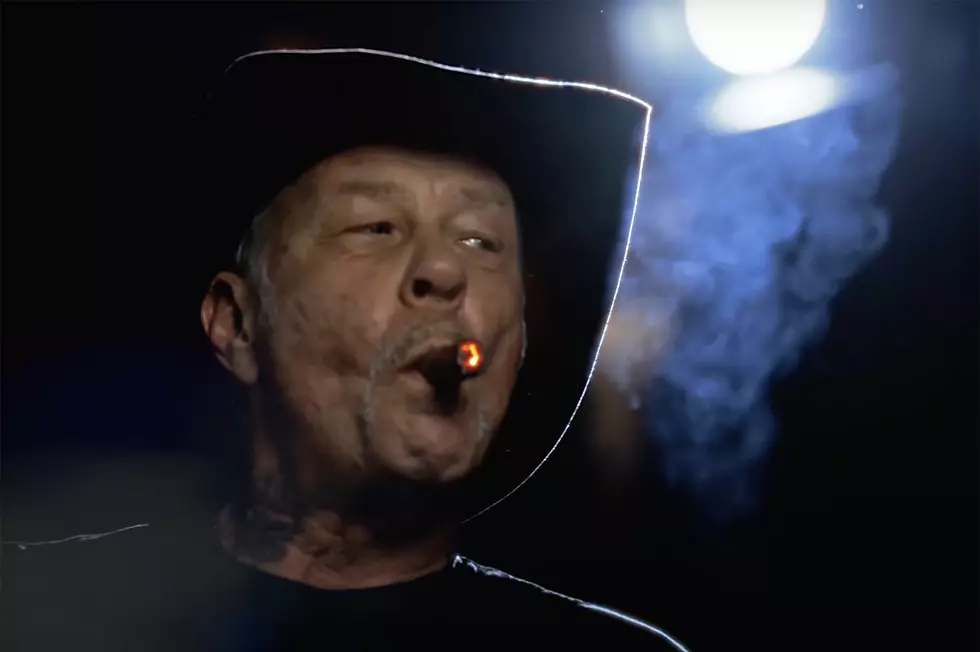
Metallica ‘Load’ Roundtable: Did They Fumble Their Big Follow-Up?
The Black Album made Metallica superstars, but it also painted them into a corner.
By mostly abandoning its thrash roots and simplifying its music for mass consumption, the band sold more than 30 million copies of the 1991 self-titled LP.
But they really couldn't take that formula much further, and there was a sense, at least among hardcore fans, that Metallica had already wandered too far from their strengths. So when the follow-up, 1996's Load, finally arrived, many were surprised to find even less thrash, as Metallica experimented with Southern rock, country, blues and even alternative sounds.
Nobody expected the success of the Black Album to strike again, but Load came close, ringing up a whopping 13 million copies to date and spawning several hit radio songs. The album received mixed to positive reviews, and much was made of the new haircuts and expensive clothing the band sported in press photos. So, all these years later, we asked five of our writers to weigh in on some big Load questions.
Was "Until It Sleeps" the best choice for lead single? Did the new hairdos affect how people heard the music? Was the album too long, and should it have been combined with 1997's Reload? Here's what they said.
Looking back, what are your overall thoughts on Metallica's Load?
Gary Graff: The prevailing feeling is good for them. We saw this coming; anybody who really paid attention to Metallica could hear that the group was interested in exploring different aspects of heavy rock, as well they should have been. Thrash doesn't have to be a dead end, but Metallica had done so much to define the form that the best course for them was to, as we're fond of saying these days, pivot somewhat into a different direction. Twenty-five years later I still find it refreshing, albeit yes, different, from the 'tallica we know and love best.
Matthew Wilkening: They were right to try and update their sound, the Black Album formula burned out very quickly. But where they chose to go wasn't really interesting enough to sustain an album this long, especially since they continued to completely ignore their thrash roots. Corrosion of Conformity's Wiseblood, released the same year, mined similar "Skynyrd Meets Sabbath" territory with much better results.
Annie Zaleski: Load in hindsight feels much more of a slog than I remembered. Long song lengths worked so well for Metallica in the '80s because the band were at the peak of their thrash power: racing through songs with interesting, aggressive arrangements and velocity-laden performances. These Load arrangements feel plodding instead and could use editing to make the songs more concise, which would make them have more of an impact. Songwriting-wise, while the singles remain incisive and memorable, a lot of the other tunes sound pretty generic.
Matt Wardlaw: On paper, this album should have been a disaster. Clocking in at 79 minutes, one can imagine that anyone who brought a song to the sessions got it on the record. Listening back, though, it's clear that they really did give careful consideration to each minute of music that went on the album. At the time, this felt like Metallica's version of being adventurous and taking chances in the studio, and looking at the albums that they've made since then, the Load sessions might be the last time that they really took any risks.
Michael Christopher: It was a total shock. This was not the same band that did “Master of Puppets” and “Blackened.” It was even a far cry from the group that did “Enter Sandman.” Completely threw me for a loop.
Was "Until It Sleeps" the right first single? If not, what should it have been? What’s the most underrated track on the album?
Graff: This is a salient point. "Until It Sleeps," I think, put fans back on their heels a bit - which was the point, of course. "King Nothing" probably would have been a better "transition" kind of track to get folks on board and perhaps more receptive to the more dramatically new material on the album. The most underrated? I'm partial to "2x4." Love the fat groove, the bluesy attitude, the swampy roadhouse feel. It's an iron-pumper.
Wilkening: It was an admirable swing for the fences, that's for sure. It got people talking, but it's doubtful that it won them any new alternative-leaning fans, if that was the goal. "Hero of the Day" would have been a safer choice. If Load was released in 2021, they probably would have released one of the rockers - maybe "Ain't My Bitch" - alongside "Until it Sleeps" to hedge their bets and try to keep the old-school fans happy. Underrated? "Ain't My Bitch" and "2x4" are by far the best songs on the album, but "Bleeding Me" successfully rides a simmering groove for over eight minutes.
Zaleski: I don't think it was the right single - the song felt a bit low-energy and grungy, if not a bit bland, which was disappointing after the Black Album's sound and success. I say "King Nothing" would've been better, as it felt more ferocious. Underrated? "Mama Said." The band (unsurprisingly) do country-leaning ballads well.
Watch Metallica's 'Until It Sleeps' Video
The 45-Minute Police are here: This album is 78 minutes long. Which songs do you cut off to get it to less than 45 minutes?
Graff: It's a load (ar, ar, ar), that's for sure. It's essentially an old-school double album, as many became during the CD era. While I like most of these songs, I think you could trim "Cure," "Poor Twisted Me," "Thorn Within," "Ronnie" and "The House Jack Built," and have a tighter, perhaps more representative, album.
Wilkening: They should have cut "The House Jack Built" and everything from "Cure" to "Ronnie." Admittedly, that further reduces Load's diversity, but it keeps the best songs and makes for a much tighter album.
Zaleski: "The Outlaw Torn," "The House Jack Built," "Cure," "Bleeding Me" and "Hero of the Day."
Wardlaw: Cut "The House That Jack Built," "Cure," "Mama Said," "Ronnie" and "The Outlaw Torn," and I'm two minutes over the 45 minute limit - probably partially because of "Bleeding Me." I'll take the punishment. It was honestly tough to pull some of these songs ("The House That Jack Built") and easy to do in some cases ("Ronnie").
Christopher: Get rid of the blatant Danzig rip-off “Thorn Within,” “Mama Said” would’ve been great on a James Hetfield solo record and “Poor Twisted Me” is beyond blah. Also: “The House Jack Built,” “The Outlaw Torn” and “Ronnie.”
Would they have been better off combining Load and ReLoad into one album? Why or why not?
Graff: On the whole, no. I think that combining the best from any random two albums by any band would potentially give you a dynamite product. But I think Load and ReLoad are strong and focused works unto themselves - cut from the same creative cloth perhaps but each with enough of its own character that the combination might sound a little jarring if tracks from each were thrown together.
Wilkening: Technically, sure, that would result in the best possible single album. But if nothing else changed, that would mean Metallica put out only one new studio effort between 1991's Black Album and 2003's St. Anger. Both Load and Reload needed to be trimmed heavily, but there's enough good-to-great stuff on each for a separate release. It would be interesting to see how these albums would have been released in 2021 - maybe some of the songs would only be available on a more expensive deluxe edition?
Zaleski: I think so. It would have led to a more focused and cohesive album with less filler.
Wardlaw: I'm a fan of them existing as separate albums - even though parts of ReLoad came to life during the Load sessions. I do think that the two records feel like different sides of the Metallica brain. I think they built a specific narrative with each album, and even though there's some bloat - especially on Load - I don't know that what they plotted out would have worked as well as a single album if they condensed it. I feel like with each of the albums, there are important album tracks that would have been lost in an attempt to cull the sessions to the "best songs." Also, it was really fun to see them selectively start to air out some of the new material ("Devil's Dance") in the concert setting before ReLoad was released.
Christopher: Without a doubt those two records should’ve been combined. Neither was strong enough to stand on its own - especially in the wake of the Black Album. You mean to tell me there’s a fan out there who says, “’Where the Wild Things Are’ is my favorite Metallica song?’” No chance. I get it was representative of the evolution of Metallica, but that doesn’t mean fans have to suffer through so many shitty songs. Look at the set lists of the band in the years since. Even they know it was a lot of bunk.
Watch Metallica's 'King Nothing' Video
Do you think their haircuts and new image affected the way the album was received?
Graff: Without question. A bit of backlash was unavoidable, no matter what the album sounded like. The new look was just more ammunition for the haters - or those that wanted to hate. But, again, Metallica wanted to provoke and get the word out that it was entering a new era, and the message came through loud and clear, to a fault.
Wilkening: For sure. As always, it's admirable whenever somebody tries something new. But even in the moment, some of it seemed a bit forced, which tied into the notion that their music was moving too far away from what they did best. The fact that they all seemed to go back to something resembling their previous fashion sense in the years that followed suggests they realized it wasn't the most natural fit and certainly not the reason people loved Metallica.
Zaleski: Oddly enough, yes! It seems almost silly now, but Metallica cutting their hair was such a big deal. It was perceived like they were jumping on some "alternative rock" bandwagon, something underscored by the sound of "Until it Sleeps." Metallica's shift wasn't that drastic, but it was positioned as one.
Wardlaw: Absolutely. It shouldn't have made a difference, but at the time this album was released, people definitely were shocked at the "new Metallica" and used the updated look as ammunition for why they hated the record.
Christopher: Absolutely. And a lot of it was their own fault. The advertisements featuring the new logo, sans their name, this big mystery over what was happening in Metalli-land … oh, and that head-banging band now without the hair? They knew what they were doing, without a doubt. But the furor over it? That was ridiculous. Today it would never fly, but then – wow – what an unreal shit show. Fans and media should look back on that episode and hang their heads in shame.
Metallica Albums Ranked
More From Ultimate Classic Rock









